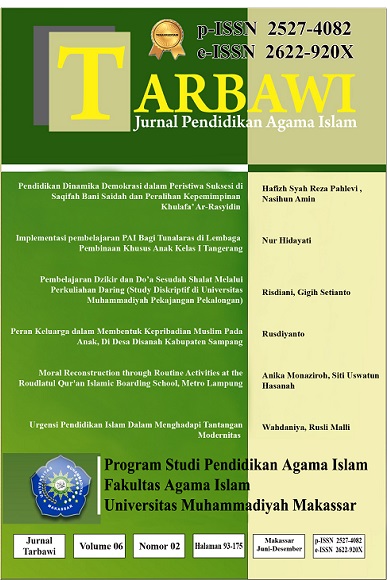Pengaruh hidden curriculum dalam Pembentukan karakter Religius peserta didik di SMK Islam Lukman Al Hakim Kabupaten Bogor
DOI: https://doi.org/10.26618/jtw.v8i02.4922
Hidden Curriculum, religious character, SMK
Abstract
In an era of increasingly advanced technology, more and more information is easily accessible to students, so that students in schools, especially vocational schools, experience many difficulties in forming religious characteristics. Seeing the phenomenon of degradation that occurs in education in Indonesia today, it is necessary to take the role of an appropriate education curriculum in order to overcome these problems.
The focus of the problem in this study is the effect of implementing the hidden curriculum in the formation of the religious character of students in SMK. Researchers limit the problems that will be the object of research at SMK Islam Lukman Al Hakim. This study aims to determine the implementation of the hidden curriculum at SMK Islam Lukman Al Hakim. The approach used in this research is filed research. Researchers searched for data based on interviews, questionnaires, and reviewed documents and FGDs related to the research focus. Data analysis was performed using descriptive analysis and triangulation methods.
The results found by the researcher were that the effect of the implementation of hidden curriculum activities at SMK Islam Lukman Al Hakim had a positive influence on the formation of the religious character of students. Hidden curriculum is a driving force to achieve national education goals. The form of hidden curriculum activities in the formation of religious character which is carried out in SMK is an activity of habituation, exemplary and advice and motivation given by teachers to students. This becomes the basis for formulating the concept of hidden curriculum in the moral development of students in junior high schools, among others, by mapping the moral problems of students in junior high schools, making policies, making strategies, planning activities and conducting ongoing evaluationsReferences
Abdullah Idi, Pengembangan Kurikulum: Teori & Praktik, (Jogjakarta: Ar-Ruzz Media, 2010), cet. Ketiga
Baharun, H. , Pendidikan Anak Dalam Keluarga; Telaah Epistemologis. Pedagogik, 2016
Bungin, Burhan.2012. Penelitian Kualitatif : Komunikasi, Ekonomi, Kebijkan Publik dan Ilmu Sosial lainnya. Jakarta : Kencana Prenada Media Group.
Caswita. The Hidden Curriculum.Yogyakarta: Leutikaprio, 2013
Dede Rosyada, Paradigma Pendidikan Demokratis , Jakarta: Kencana Prenada Media Group, 2007
Idrus, Muhammad. 2009. Metode Penelitian Ilmu Sosial. Jakarta: Erlangga
John M. Echols dan Hasan Syadily, Kamus Inggris Indonesia, Jakarta: Gramedia Pustaka Utama, Cet. XXIII, 2008
Kartono dan Kartini. Pengantar Meteodologi Riset Sosial. Mandar Maju. Bandung. 1996
Ley J. Moeleong, Metode Penelitian Kualitatif, Bandung: Remaja Rosdakarya, 1991,
Mardiansyah, Tindak Kekerasan Di Kalangan Siswa Sma/Smk, Jurnal Penelitian Kebijakan Pendidikan Volume 10, Nomor 2, Agustus 2017
Mohammad Ansyar, Kurikulum hakikat, fondasi, desain dan pengembangan, Jakarta: Kencana Prenadamedia Group, 2015
Rakhmat Hidayat, Pengantar Sosiologi Kurikulum, (Jakarta :Raja Grafindo,2011)
Subandijah, Pengembangan dan Inovasi Kurikulum, (Jakarta: PT Raja Grafindo Persada, 1996)
Sugiyono, Metode Penelitian Kuantitatif, Kualitatif dan R&D, Bandung: ALFABETA, 2012
Sukiman, Pengembangan Kurikulum Perguruan Tinggi, Bandung : PT Remaja Rosdakarya, 2015
Downloads
Published
Issue
Section
License
Dalam hal artikel diterima oleh Tim Editorial TARBAWI: Jurnal Pendidikan Agama Islam, dengan nomor terdaftar ISSN 2527-4082 (Cetak), ISSN 2622-920X (Online) dan ada keputusan untuk menerbitkan artikel, hak cipta dari artikel dipegang oleh penulis.
Prodi Pendidikan Agama Islam, Fakultas Agama Islam, Universitas Muhammadiyah Makassar sebagai penerbit TARBAWI: Jurnal Pendidikan Agama Islam memegang hak publikasi semua artikel yang diterbitkan dalam jurnal ini.
Prodi Pendidikan Agama Islam, Fakultas Agama Islam, Universitas Muhammadiyah Makassar sebagai penerbit TARBAWI: Jurnal Pendidikan Agama Islam, dengan nomor terdaftar ISSN 2527-4082 (Cetak), ISSN 2622-920X (Online) memiliki hak untuk mereproduksi dan mendistribusikan artikel dan penulis tidak diizinkan untuk menerbitkan artikel yang sama yang diterbitkan dalam jurnal ini.
Pernyataan Keaslian dan Naskah Hak Cipta dapat diunduh: di sini
Setelah mengisi surat pernyataan, silakan kirim via email: jurnaltarbawipai@gmail.com


















